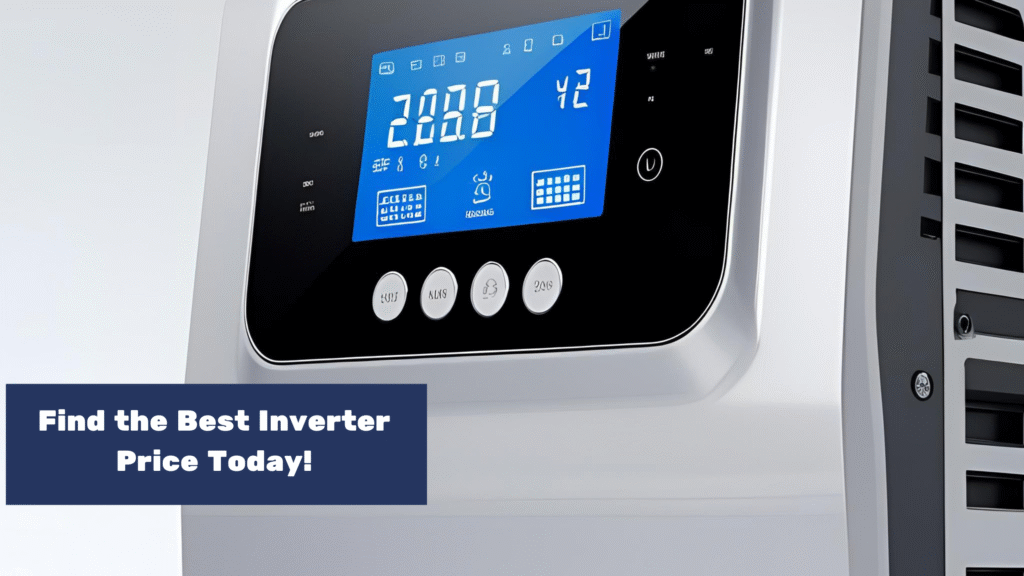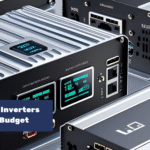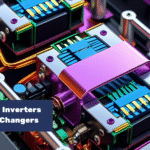Looking to Buy an Inverter? Don’t Make a Move Until You Read This
Power outages are getting more frequent, and the need for reliable backup electricity has never been more urgent. Whether you’re working from home or managing a small business, your productivity depends on uninterrupted power.
But here’s the catch—most people either overpay or get stuck with the wrong inverter for their needs.
So how do you avoid that?
This article gives you everything you need to find the best inverter price today—fast, easy, and without guesswork.
What You’ll Learn
- How to compare inverter prices without wasting time
- Where to buy quality inverters at the best rates
- What features truly matter—and which ones to skip
- Practical price points for different inverter capacities
- What influences inverter cost (beyond brand names)
- How to avoid cheap traps and overpriced hype
What Is an Inverter and Why Do You Need One?
An inverter converts DC (battery power) into AC (the kind used in homes and offices). It powers your lights, fans, computers, and appliances during blackouts.
If your region suffers from unstable grid supply or frequent load shedding, an inverter is not a luxury—it’s a necessity.
Factors That Influence Inverter Prices
Understanding what drives the cost helps you buy smart.
- Capacity (VA Rating)
- A 900VA inverter powers basic appliances like fans and lights.
- A 2kVA inverter handles more: TVs, laptops, small fridges.
- 3.5kVA+ inverters can run larger appliances like ACs and washing machines.
- Type of Inverter
- Sine Wave Inverter – Stable and ideal for sensitive electronics. Higher cost.
- Square Wave Inverter – Cheaper, but less efficient and noisier.
- Hybrid Inverter – Can work with both grid and solar. Great flexibility.
- Battery Type Compatibility
- Lead-acid batteries are cheaper upfront.
- Lithium-ion batteries are expensive but last longer.
- Brand and Warranty
Well-known brands often charge more, but offer better support and longer warranties.
Current Price Range (Based on Market Averages)
Here’s a rough guide to today’s best inverter prices by capacity:
| Capacity | Type | Approx. Price (USD) |
| 900VA | Sine Wave | $110 – $150 |
| 1.5kVA | Sine Wave | $170 – $220 |
| 2.5kVA | Sine Wave | $250 – $330 |
| 3.5kVA | Hybrid | $400 – $520 |
| 5kVA | Hybrid | $600 – $800 |
Prices vary depending on your region, shipping fees, and retailer margins.
Where to Find the Best Deals on Inverters
- Online Retailers
- Amazon, Walmart, and Best Buy offer price comparisons and customer reviews.
- Many local e-commerce sites now stock certified inverter brands.
- Local Electrical Shops
- You may get a better deal with installation included.
- Ask for discounts if you’re buying both inverter and battery.
- Direct from Manufacturer
- Brands like Luminous, Su-Kam, APC, and Growatt often offer seasonal promotions.
Tip: Always cross-check online price with at least two local suppliers.
What Features Should You Look For?
Not all inverters are built the same. Don’t pay for extras you don’t need.
Must-Have Features
- Battery level indicator
- Overload protection
- Fast switching time
- Low harmonic distortion
Nice-to-Have (But Optional)
- WiFi monitoring
- LCD display
- Solar panel compatibility (unless you plan to go solar soon)
Mistakes That Cost Buyers Money
- Choosing Based on Price Alone
Cheap models often fail within a year or lack replacement parts. - Ignoring Load Requirements
If you underestimate your power needs, your inverter will trip constantly. - Skipping Warranty and Support
Always choose a unit with at least a 1-year warranty and local service availability.
Actionable Tips for Getting the Best Inverter Price
- List all appliances you want to power
- Calculate total wattage, then add 20% buffer
- Match inverter VA to that wattage
- Read 3–5 customer reviews before buying
- Avoid used units unless certified by the manufacturer
- Compare prices across at least 3 platforms
Best Inverter Brands Right Now
Here are some of the most trusted names in the market today:
- Luminous – Widely available, value for money
- Sukam – Reliable build, decent support
- Microtek – Affordable and beginner-friendly
- APC by Schneider – High quality, good for office setups
- Growatt – Ideal if you want to integrate solar
Each brand has models tailored to different budgets and use cases.
Is Now a Good Time to Buy?
Inverter prices tend to rise in the rainy and dry seasons when outages increase. Buying during off-peak months or sales can save you money.
Retailers also tend to offer combo deals—watch out for battery + inverter bundles.
Still Unsure What to Pick?
Ask yourself:
- Will I expand to solar soon?
- What’s my daily usage like?
- Do I need quiet operation or rugged performance?
Your answers will guide your buying decision more than price alone.
Final Take
Don’t rush into buying just because your neighbor did.
Your needs are different.
Focus on getting value—not just a low price.
When you match features, capacity, and budget the right way, you’ll get an inverter that saves you money for years.



